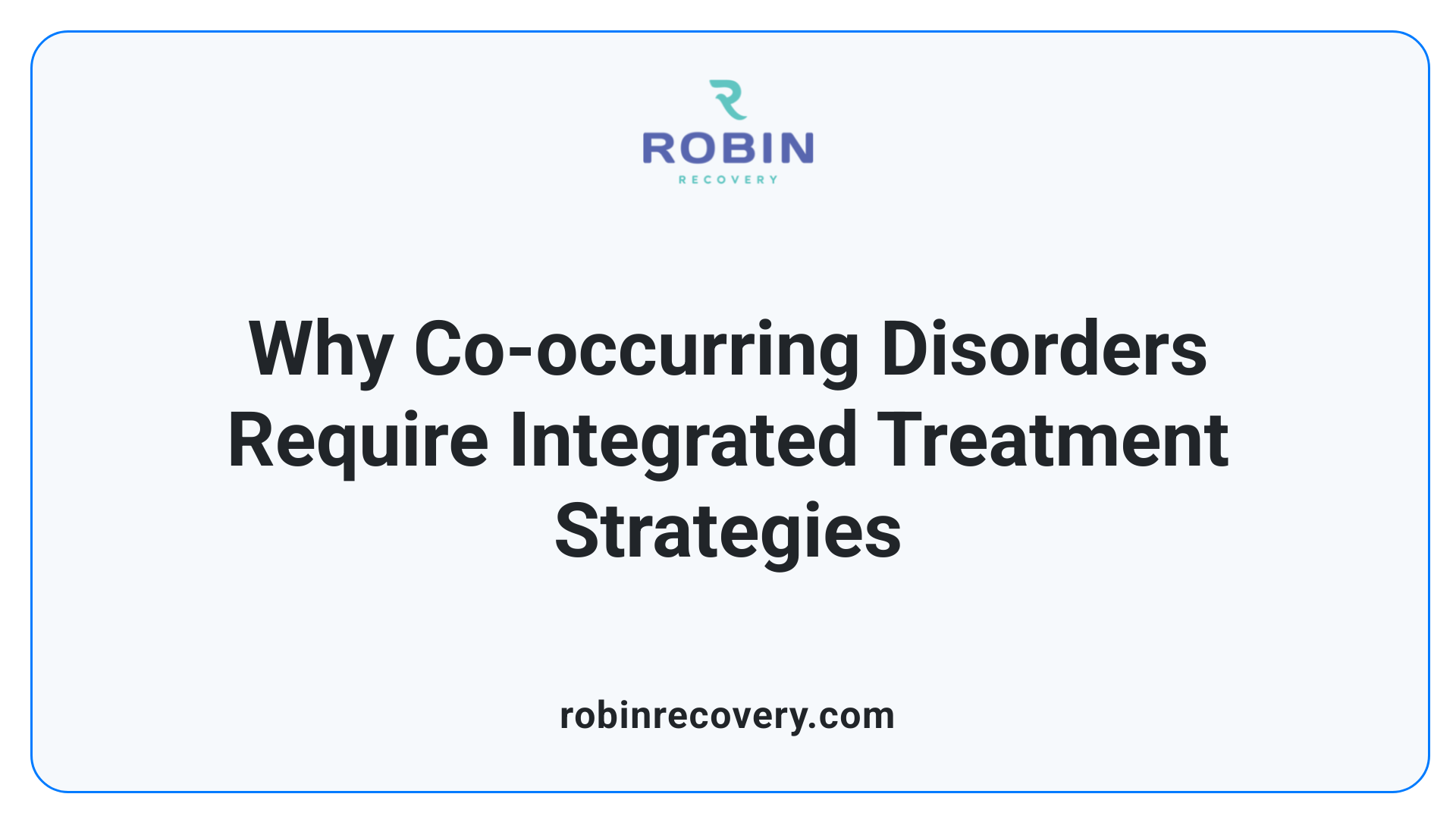The Role of Medication in Dual Diagnosis Treatment

Understanding the Synergy of Medication and Therapy in Dual Diagnosis Care
Effective treatment of dual diagnosis, which involves co-occurring mental health and substance use disorders, requires a comprehensive approach that seamlessly integrates medication management with behavioral therapies. Medications serve as a cornerstone in stabilizing moods, reducing cravings, and alleviating symptoms, enabling individuals to actively participate in recovery programs. This article explores the pivotal role of medication in dual diagnosis treatment, detailing the types of medications used, how they support long-term recovery, and strategies for optimal integration with behavioral therapies.
The Intersection of Mental Health and Substance Use Disorders

What is dual diagnosis and co-occurring disorders?
Dual diagnosis, also known as co-occurring disorders, describes the simultaneous presence of a mental health condition and a substance use disorder in an individual. Common mental health issues include depression, anxiety, bipolar disorder, and PTSD, while substance use may involve alcohol, prescription drugs, or illicit substances. The two conditions often influence each other, with mental health problems leading to substance abuse as a form of self-medication, and ongoing substance use exacerbating mental health symptoms.
Co-occurring disorders complicate diagnosis and treatment, as each can impact the severity and manifestation of the other. Proper assessment is essential to identify both issues accurately, and treatment typically involves an integrated approach to address both conditions at the same time.
Complex relationship between mental health and addiction
The relationship between mental health and addiction is bidirectional. Mental illnesses like depression or PTSD can drive individuals to seek relief through substances, while substance use can induce or worsen mental health conditions by changing brain chemistry. This interplay creates a cycle where untreated symptoms make recovery more difficult.
Research indicates that shared risk factors such as trauma, genetics, or environmental influences can contribute to both disorders. Additionally, substance use disorder (SUD) can trigger or intensify mental health crises, creating a complex medical challenge.
Impacts on diagnosis and treatment approaches
These intertwined issues necessitate comprehensive treatment strategies. Relying solely on treatment for either mental health or substance use disorder often leads to poor outcomes or relapse. Therefore, healthcare providers typically perform thorough assessments and develop personalized, integrated treatment plans.
Effective treatment combines behavioral therapies like Cognitive Behavioral Therapy (CBT) and Dialectical Behavior Therapy (DBT) with medication management. Medications can help stabilize mood, reduce cravings, and manage symptoms such as anxiety or depression.
What is the role of medication in treating co-occurring mental health and substance use disorders?
Medications are vital in treating dual diagnosis by targeting brain chemistry imbalances that underlie many mental health and addiction symptoms. For example, antidepressants like SSRIs can alleviate depression and anxiety, while antipsychotics manage psychotic symptoms. Mood stabilizers help regulate mood swings in disorders like bipolar disorder.
In addition, specific medications assist in addiction treatment. Opioid use disorder, for instance, can be managed with methadone, buprenorphine, or naltrexone, which help diminish cravings and prevent relapse. These medications facilitate long-term recovery and enhance the effectiveness of behavioral therapies.
Medication management is tailored to each individual, considering their specific conditions, medical history, and response to treatment. Healthcare providers continuously monitor effects and side effects to optimize benefits while minimizing risks.
In summary, medications serve as a cornerstone in dual diagnosis treatment, helping stabilize symptoms, improve mental and physical health, and support ongoing recovery efforts. When combined with therapy and support services, medication management significantly enhances the prospects for long-term stability and improved quality of life.
Medications Used for Dual Diagnosis Treatment
What medications are used in dual diagnosis treatment?
Treating dual diagnosis often involves a combination of medications aimed at alleviating symptoms of both mental health conditions and substance use disorders. These medications are chosen based on individual needs and specific diagnoses, with careful consideration to avoid adverse interactions.
Common medications include antidepressants, anxiolytics, antipsychotics, and mood stabilizers. For instance, SSRIs like Prozac and Zoloft are frequently prescribed for depression and anxiety, helping to manage mood swings and emotional regulation.
In cases of psychotic disorders or severe mood disorders, antipsychotic medications such as Risperdal or Latuda may be used. Mood stabilizers like Lithium, Depakote, or Lamictal help regulate oscillating mood states often seen in bipolar disorder.
For substance use, medications such as methadone, buprenorphine (Suboxone), and naltrexone (Vivitrol) are pivotal. They assist in reducing cravings, minimizing withdrawal symptoms, and preventing relapse, especially in opioid addiction.
Interestingly, some medications can treat multiple disorders simultaneously. Bupropion, for example, is approved for depression and nicotine dependence, providing a dual benefit to patients with co-occurring depression and tobacco addiction.
Overall, medication management in dual diagnosis is tailored to each person, with ongoing monitoring to maximize effectiveness and minimize side effects. Combining pharmacotherapy with behavioral therapies offers the best chance for sustained recovery.
Medication options overview
Medication Type Examples Primary Use Additional Notes Antidepressants SSRI (Prozac, Zoloft), SNRI (Cymbalta, Effexor) Depression, anxiety Help alleviate mood symptoms and emotional dysregulation Anxiolytics Buspirone, some beta-blockers Severe anxiety, panic attacks Usually non-addictive; caution in substance use contexts Antipsychotics Risperdal, Latuda Psychotic disorders, bipolar episodes Manage hallucinations, delusions Mood Stabilizers Lithium, Depakote, Lamictal Bipolar disorder Prevent mood swings and stabilize mood Medications for SUD Methadone, Buprenorphine, Naltrexone Opioid addiction Reduce cravings, block effects of opioids
This integrated approach, combining these medications with therapy and support, plays a vital role in improving long-term outcomes for individuals with dual diagnosis.
How Medication Facilitates Stabilization and Recovery

How does medication contribute to stabilizing mental health and supporting recovery in dual diagnosis?
In dual diagnosis treatment, medication is essential for managing both mental health symptoms and substance use behavior. Psychiatric drugs such as antidepressants, antipsychotics, and mood stabilizers target specific mental health issues like depression, bipolar disorder, and psychosis. These medications help reduce emotional dysregulation, mood swings, and symptoms like anxiety or hallucinations, creating a more stable mental state.
Furthermore, medications like methadone, buprenorphine, and naltrexone are used within Medication-Assisted Treatment (MAT) to curb cravings and ease withdrawal from substances. This not only diminishes the physical urge to use drugs or alcohol but also supports abstinence and reduces relapse risk.
Medication management involves regular assessment, carefully monitoring effects, adjusting doses, and supporting adherence. This ongoing process ensures that medications work effectively with minimal side effects, maintaining overall treatment safety.
Combination with therapy for holistic treatment
Medications alone are rarely sufficient; they are most effective when combined with behavioral therapies such as Cognitive Behavioral Therapy (CBT) or Dialectical Behavior Therapy (DBT). This integrated approach addresses underlying causes of mental health issues and substance use, promoting skills development and emotional resilience.
Support groups and other community resources further reinforce recovery efforts, helping individuals maintain sobriety and enhance mental well-being.
Monitoring and ongoing adjustments
Effective medication use requires continuous oversight by healthcare professionals. Regular follow-ups enable clinicians to evaluate medication efficacy, observe side effects, and make necessary adjustments. This personalized medication management ensures that treatment remains aligned with the individual’s evolving needs and promotes long-term stability.
In conclusion, medication forms a cornerstone of dual diagnosis treatment. It stabilizes mood, reduces cravings, manages withdrawal symptoms, and supports engagement in therapy. When integrated into a comprehensive care plan, medication helps individuals achieve better health outcomes, develop resilience, and sustain recovery over time.
Integrating Medication and Behavioral Therapies

How is medication integrated with behavioral therapies in dual diagnosis treatment?
In dual diagnosis treatment, medication works hand-in-hand with behavioral therapies such as cognitive behavioral therapy (CBT) and dialectical behavior therapy (DBT). This integrated approach involves a multidisciplinary team of healthcare professionals who coordinate to develop personalized treatment plans.
Medications are prescribed to manage symptoms like cravings, emotional upheaval, psychosis, or anxiety, providing a stable foundation for recovery. Meanwhile, therapies address underlying psychological issues, teach coping skills, and promote healthy behavioral changes.
This combination enhances treatment effectiveness by reducing the likelihood of relapse, improving adherence to medication and therapy, and building long-term resilience. Regular evaluation and adjustment of both medication dosages and therapeutic techniques ensure that the approach remains tailored to the individual's evolving needs.
By collaborating closely, clinicians can optimize the benefits of both modalities, creating a comprehensive support system that tackles the complexities of co-occurring disorders. This synergy not only improves immediate symptom management but also fosters lasting recovery and improved overall well-being.
Strategies for Effective Medication Management

What are strategies for medication management in dual diagnosis treatment?
Effective medication management is a vital component in the treatment of dual diagnosis, where individuals face both mental health disorders and substance use problems. Personalized medication plans are developed based on each patient’s unique needs, considering their specific mental health condition, substance use history, and overall health. This tailored approach helps ensure that medications address symptoms effectively while minimizing side effects.
Regular monitoring of medication effectiveness and potential adverse effects is essential. Clinicians continuously evaluate how well the prescribed drugs are controlling symptoms and adjust dosages as necessary. Monitoring also includes checking for drug interactions, especially given the complex medication regimens often involved in dual diagnosis cases.
Coordination among various healthcare providers is crucial. A team approach—combining psychiatrists, addiction specialists, therapists, and primary care physicians—ensures that the medication strategy aligns seamlessly with psychotherapy, behavioral therapies, and support services.
Patient education plays a significant role in medication adherence. Patients should understand why they are taking specific medications, how they work, and the importance of consistent use. Support in overcoming barriers to adherence, like managing side effects or addressing misconceptions, encourages ongoing cooperation.
Incorporating medication management into a comprehensive treatment plan that includes therapy, lifestyle changes, and community support increases the likelihood of stable recovery. Ongoing evaluation and close communication among all providers help optimize medication use, prevent relapse, and support long-term health for individuals with co-occurring disorders.
Conclusion: Comprehensive Care for Lasting Recovery
How does medication contribute to stabilizing mental health and supporting recovery in dual diagnosis?
Medication is a vital component in managing dual diagnosis, helping to stabilize mental health symptoms and support sustained recovery. It targets specific conditions like depression, anxiety, mood swings, psychosis, and cravings through drugs such as antidepressants, antipsychotics, and mood stabilizers.
By reducing symptoms like emotional turmoil, impulsivity, and suicidal thoughts, medication creates a more stable mental state, enabling individuals to engage more effectively in therapy and other support services. Medication management requires careful oversight, regular monitoring, and adjustments to optimize benefits and minimize side effects.
When combined with behavioral therapies and supportive interventions, medications aid in reducing relapse risks and promoting long-term sobriety and mental health stability. This holistic approach addresses both chemical imbalances and psychological challenges, making medication an essential part of the journey toward lasting recovery.
Fostering Sustainable Recovery Through an Integrated Medical Approach
In conclusion, medication forms a fundamental component of effective dual diagnosis treatment, facilitating mental health stabilization, reducing cravings, and supporting sustained recovery. When combined with behavioral therapies and comprehensive, multidisciplinary care, medications help individuals achieve better treatment outcomes and improve their quality of life. Ongoing monitoring, personalized medication plans, and the support of a skilled healthcare team are essential to navigate potential side effects and optimize benefits. As research continues to develop new pharmacological interventions and integrated models, the future of dual diagnosis treatment promises more tailored, effective solutions that foster resilience and long-term sobriety. Healthcare providers and patients must work collaboratively to ensure that medication management remains a central pillar in the journey towards recovery, enabling individuals with co-occurring disorders to rebuild their lives in stability and hope.
References
- Dual Diagnosis: Definition & Treatment
- Medication Management | Dual Diagnosis Treatment
- Medication Management in Dual Diagnosis Treatment
- Substance Use and Co-Occurring Mental Disorders
- Dual Diagnosis
- Co-Occurring Disorders and Other Health Conditions
- Treatment for Substance Use Disorder With Co-Occurring ...
- 5 Things to Know About Dual Diagnosis Treatment
- Effective Strategies for Managing Dual Diagnosis
